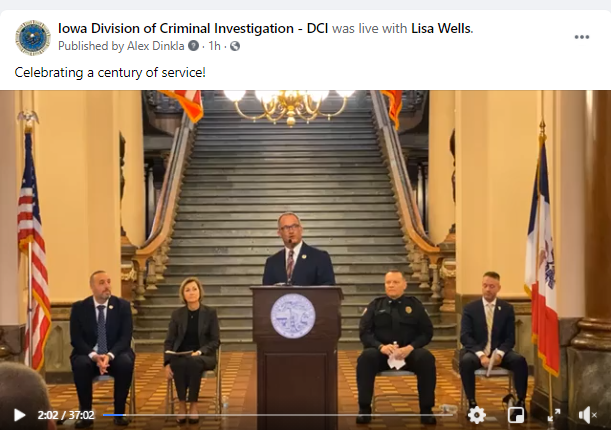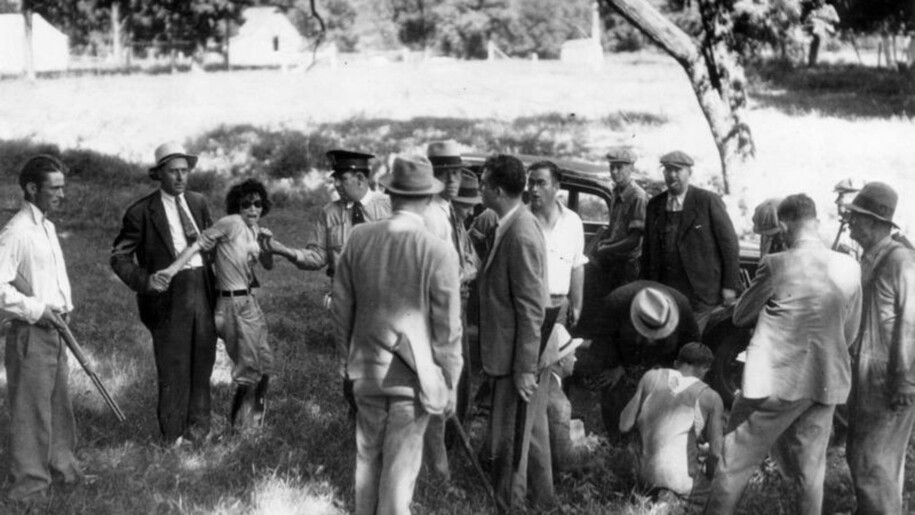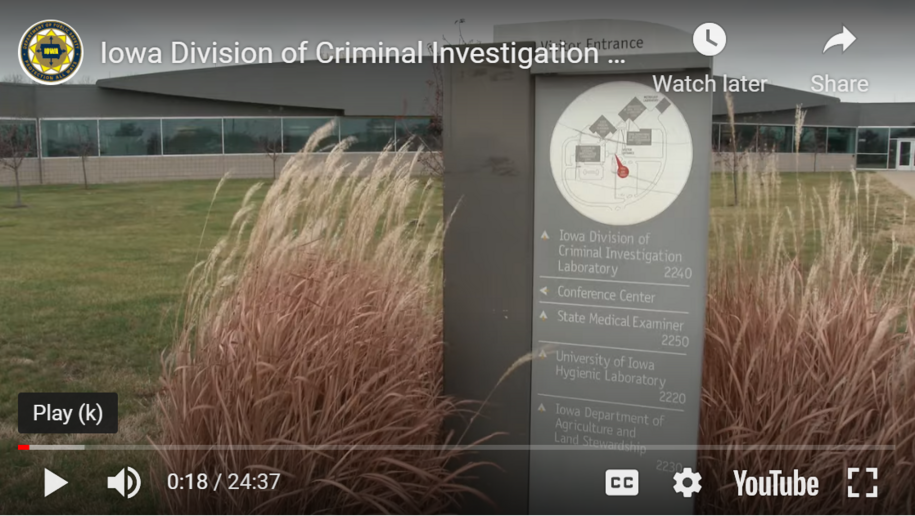April 9, 2021
DES MOINES, Iowa – On this date 100 years ago, the Iowa Legislature bestowed authority in Attorney General Ben Gibson to establish the Bureau of Criminal Investigation, a centralized law enforcement agency specializing in providing cost-free support to local law enforcement agencies. From its humble beginnings of a handful of agents and a budget of $37,000, the bureau has grown into the Division of Criminal Investigation (DCI), which provides a full spectrum of criminal investigation services from investigative field operations, to forensics analysis, to support to the Iowa Racing and Gaming Commission.
Earlier today, Governor Kim Reynolds led a special DCI 100th Anniversary commemorative event at the Iowa Statehouse to recognize the centennial along with Special Agent In Charge and DCI100 Chairperson Adam DeCamp, Special Agent and State Senator Dan Dawson, Marshalltown Police Chief Michael Tupper and Department of Public Safety Commissioner Stephan Bayens.
“I want to congratulate Commissioner Bayens and the men and women of the Department of Criminal Investigation on a century of service that has successfully adapted to the unique challenges of every era,” Governor Reynolds stated. “The people of Iowa are truly fortunate to be served by a law enforcement agency with such a long and distinguished record.”
“A call to the DCI is one that many law enforcement agencies hope to never make,” said Department of Public Safety Commissioner Stephan Bayens. “But should that call come, there’s a team of dedicated men and women who have been conditioned by a lasting legacy to provide tireless support and compassion. They stand shoulder to shoulder with state, local, and federal partners across the state to protect the innocent and hold accountable those who deserve justice,” Bayens said.
Honoring The Past
From these humble beginnings, the BCI’s early focus was on crimes against persons, such as suspected homicides, unexpected deaths, and felonious assaults, as well as gang crimes, rapes, and the notorious crackdowns on liquor production and gambling. In 1939, the BCI joined the new Department of Public Safety as a charter bureau.
With the creation of the Criminalistics Laboratory in 1970, the responsibility for crime scene examination and the preservation and examination of physical evidence shifted to lab experts. As a result, an agent was able to spend more time on field investigations interviewing potential witnesses and providing quicker case resolutions.
In 1983, the unification of law enforcement agencies under a larger umbrella grew the Bureau to Division, a name and structure that holds today.
For much of this century, the DCI has operated to help find answers to Iowa crimes from the days of helping apprehend the infamous “Barrow Gang,” to assisting with identifications in the crash of United flight 232, to the high-profile search for Mollie Tibbetts and investigating and recording offenders in all 99 counties.
While the DCI has changed significantly since its launch as a Bureau a century ago, one thing has remained the same – a foundational standard of excellence in providing premier investigative services to local, state and federal partners.
Shaping The Future
Today, the DCI mission has expanded and diversified into three bureaus: Field Operations, Support Operations, and Special Enforcement Operations, as well as the nationally-recognized Criminalistics Laboratory which provides service for all of Iowa’s forensics examinations. DCI Special Agents are not only trained in evidence collection, interview and interrogation, and major case management, but now receive training to document a growing volume of digital crime scenes.
DCI services are relied upon not only by law-enforcement partners, but also by the public and employers. It also is the source for information on the state’s registered sex offenders, maintaining the integrity of Iowa’s licensed casinos, and background checks in the form of criminal history records that are vital to the criminal justice system.
Other key DCI operations highlights include:
• The DCI has a staff of nearly 220 sworn agents and civilian employees.
• The division maintains more than 1.1 million criminal history files, some dating back to the 1930s.
• Agents with the Major Crime Unit (MCU), considered the backbone of the DCI, respond at a moment’s notice to some of the most horrific crimes imaginable. From murders to kidnappings, to sexual assaults, these agents are called upon for their expertise, their compassion for victims, and their relentless pursuit of the perpetrators of these crimes. Arrest warrants, generated primarily from MCU investigations have increased 851% from 2008-2020.
• The Special Enforcement Operations Bureau provides support to the Iowa Racing and Gaming Commission with nearly 60 agents assigned to the 19 state-licensed casinos. SEOB provides focus on financial crimes, such as money laundering, credit card fraud, suspicious financial activity reporting and cash transaction reporting, as well as human trafficking and intelligence collection.
• The Criminalistics Laboratory performs technical assistance involves the recognition, recovery, packaging, marking, sealing and analysis of physical evidence, preparation of technical reports of the analyses and court testimony. Forensics examinations alone have increased 376% from 2008-2020.
• A new DCI Cyber Crime Bureau will address the fact that every case worked has a digital component, such as a cell phone, computer, internet service provider, cloud storage, or social media application. Data retrieved and evaluated from personal electronic devices and storage devices that measured gigabytes (GB) in early cases, has exploded to petabytes (PB) — the equivalent of one million gigabytes.
• The Internet Crimes Against Children Task Force (ICAC) provides expertise in investigative and forensic services to assist with youth digital crimes. This unit has seen a 1,570% increase in cyber tips from 2008-2020.
• The Iowa Sex Offender Registry contains 6,445 registrants and maintains a rate of 98% compliance.
LINK TO COMMEMORATIVE EVENT LIVESTREAM:
LINK TO COMMEMORATIVE EVENT PHOTOS:
LINK TO HISTORICAL AND CURRENT PHOTOS:
LINK TO DCI CRIMINALISTICS LABORATORY VIRTUAL TOUR:
For more information about DCI 100th Anniversary milestones, visit the DCI100 Anniversary page on the Department of Public Safety website.
ABOUT THE IOWA DEPARTMENT OF PUBLIC SAFETY
The Iowa Department of Public Safety (DPS) is the largest law enforcement agency in the state. It includes six divisions and several bureaus, all working together with local, state and federal government agencies and the private sector, to keep Iowa a safe place by following our core values: leadership, integrity, professionalism, courtesy, service and protection. Divisions within the Iowa DPS: Iowa Division of Criminal Investigation, Iowa Division of Narcotics Enforcement, Iowa State Patrol, Iowa State Fire Marshal Division, Iowa Division of Intelligence and Fusion Center, and Administrative Services Division. The Department of Public Safety is led by the Commissioner who is appointed by the Governor.
Iowa Department of Public Safety
215 E 7th St
Des Moines IA 50319
https://dps.iowa.gov


